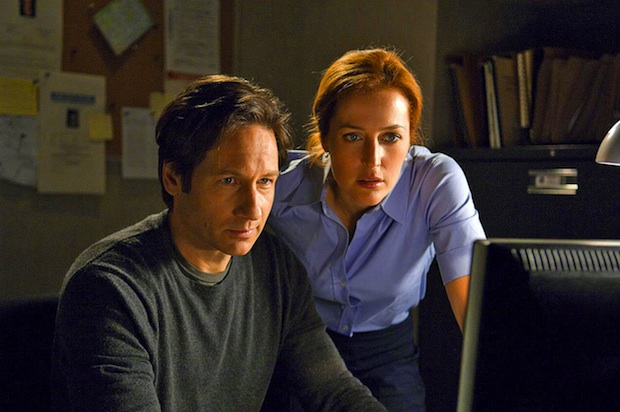The X-Files is returning to TV for a six-part “event,” and even if you’re like me (and have never seen a single episode of the hugely popular 1993-2002 series), its return raises some interesting questions. No, this is not me going all Fox Mulder on you and stirring the pot on some new conspiracy theory. And yes, I know who the show’s Scully and Mulder characters are, even though I never saw the show. I don’t live under a rock!
The most serious question it raises for me, and for Public Radio International’s Elizabeth Shockman and Studio 360’s Eric Molinsky and Kurt Anderson as well, is why Americans love the kind of conspiracy theories that fuel X-Files plots. You may be saying, Hey, I don’t love conspiracy thinking, so leave me out of this! Well, you and I may not be fans of such thinking, but the popularity of the show, and other similar pop culture trends, prove that we’re not necessarily the majority.
There are many folks out there that do love thinking about conspiracy theories, so something is up. The question is what.
I believe it comes down to the fact that most people want tidy answers to the most complex and disturbing questions. In fact, for many folks, that’s when they want those answers most; conspiracy theories answer that need. In that regard, we’re all in this together: Whether we like conspiracy theories or not, most of us want answers to life’s questions.
We yearn for closure when our worlds seem to be blowing open faster than we can comprehend – often violently and/or tragically so. September 11? Must have been a conspiracy – take your pick among many theories. Rising cases of autism? Must be a conspiracy related to vaccines. Don’t like President Obama? Must be a conspiracy to cover up his “true” religion or place of birth.
Only, none of that is true!
Conspiracy theories thrive not because they’re accurate, but because it’s not easy to live with a tragic or undesirable outcome. Yet we want to keep going, and need to put the pain of unanswered questions someplace. Enter the conspiracy theory. So if that logic is correct, and I believe it is, where does that leave us?
As weird as it may seem, especially to those of us who aren’t big on conspiracy theories, it means we can stop debating the particulars with those who are drawn to think that way, and respond instead to the pain or frustration fueling their thought process. Anything less is like seeing someone screaming frantically and telling them, “Calm down.” We know how well that works, right?
It’s not easy to do – believe me when I tell you, I know – but remember that the reasons we love conspiracy theories are as real and as deeply human as the theories are false and outrageous. That being the case, we need to see these theories for what they are, and respond to those who love them, not debate the “facts” of them. Of course, when it comes to The X-Files, we may just want to love them – both the theories and the show.
Image credit: Fox

Listed for many years in Newsweek as one of America’s “50 Most Influential Rabbis” and recognized as one of our nation’s leading “Preachers and Teachers,” by Beliefnet.com, Rabbi Brad Hirschfield serves as the President of Clal–The National Jewish Center for Learning and Leadership, a training institute, think tank, and resource center nurturing religious and intellectual pluralism within the Jewish community, and the wider world, preparing people to meet the biggest challenges we face in our increasingly polarized world.
An ordained Orthodox rabbi who studied for his PhD and taught at The Jewish Theological Seminary, he has also taught the University of Pennsylvania, where he directs an ongoing seminar, and American Jewish University. Rabbi Brad regularly teaches and consults for the US Army and United States Department of Defense, religious organizations — Jewish and Christian — including United Seminary (Methodist), Yeshivat Chovevei Torah (Modern Orthodox) Luther Seminary (Lutheran), and The Jewish Theological Seminary (Conservative) — civic organizations including No Labels, Odyssey Impact, and The Aspen Institute, numerous Jewish Federations, and a variety of communal and family foundations.
Hirschfield is the author and editor of numerous books, including You Don’t Have To Be Wrong For Me To Be Right: Finding Faith Without Fanaticism, writes a column for Religion News Service, and appears regularly on TV and radio in outlets ranging from The Washington Post to Fox News Channel. He is also the founder of the Stand and See Fellowship, which brings hundreds of Christian religious leaders to Israel, preparing them to address the increasing polarization around Middle East issues — and really all currently polarizing issues at home and abroad — with six words, “It’s more complicated than we know.”

